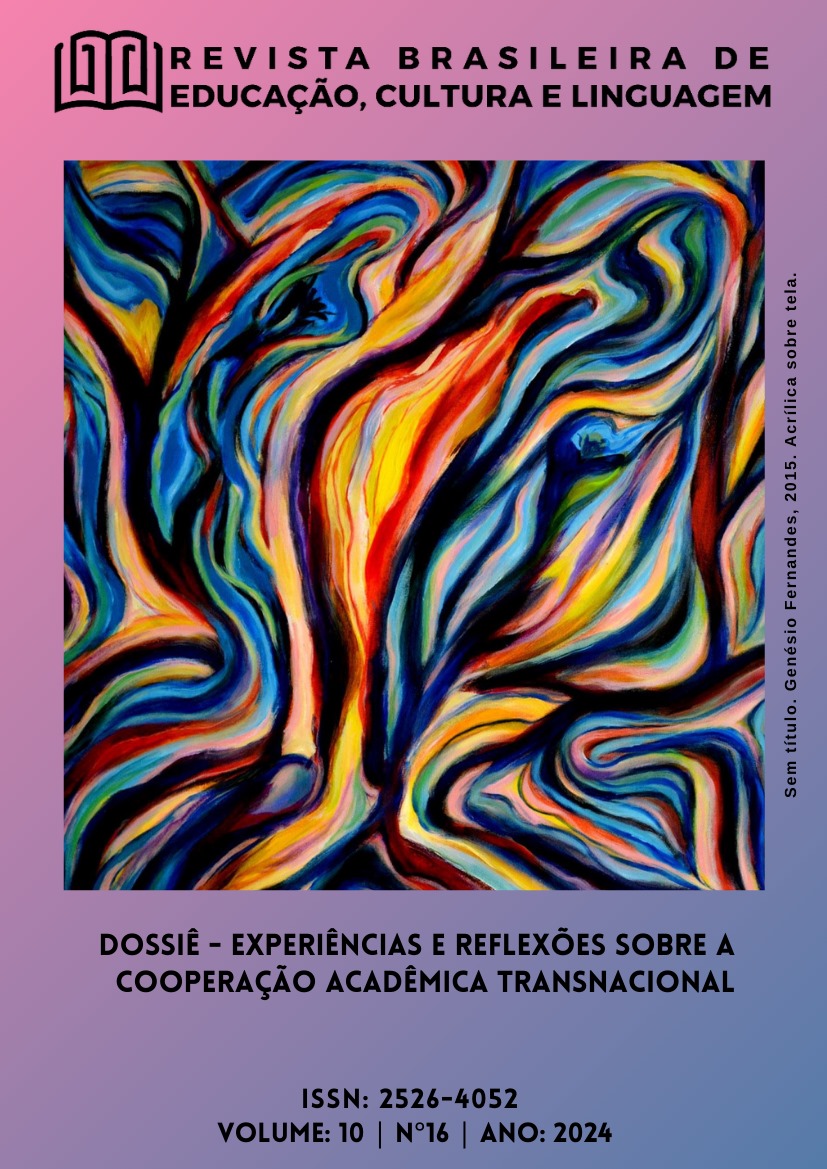A ÁFRICA E A INTERNACIONALIZAÇÃO NAS UNIVERSIDADES BRASILEIRAS: ANÁLISE INICIAL SOBRE AS POLÍTICAS DE MOBILIDADE INTERNACIONAL DA USP E DO PROGRAMA CIÊNCIAS SEM FRONTEIRAS ENTRE 2011 E 2019
DOI:
https://doi.org/10.61389/rbecl.v10i16.8587Keywords:
Internacionalização, Brasil-África, Cooperação acadêmicaAbstract
This essay aims to discuss academic mobility between Brazilian universities and higher education institutions in African countries, in the context of the internationalization process observed in the 2010s, with a particular focus on the University of São Paulo (USP) and its Faculty of Education. The paper begins with a critical analysis of the concept of diversity, often mentioned by rectors and former rectors as an important element of academic internationalization. The investigation delves into the analysis of quantitative and qualitative data on academic mobility, highlighting the Science without Borders program (2011-2017) and the postgraduate exchange scholarships offered by federal universities, with special attention to USP's internationalization data. The results indicate a predominance of agreements and academic mobility with North American and European institutions, to the detriment of African universities. In the context of the Science without Borders program, we found that less than 1% of the more than 90,000 grants awarded went to African countries, with South Africa being the only country on the continent to receive them. Furthermore, of the fifty units that have agreements with foreign universities, only twelve have agreements with African universities. However, the Faculty of Education and the Faculty of Philosophy, Languages and Literature and Human Sciences (FFLCH-USP) are making an active effort to internationalize, in contrast to the general trend. The essay also addresses the phenomenon of epistemic racism in internationalization, evidenced by the valorization of European institutions to the detriment of the epistemic capacities of African universities. This study concludes that, despite the rhetoric in favour of diversity, the practice of internationalization in Brazilian universities, particularly at USP, reveals a preference for partnerships with the global North, neglecting potential collaborations with the African continent.
References
ACOSTA, Lucilene Soares. BARZOTTO, Valdir Heitor. Valdir Heitor BARZOTTO; Lucilene Soares Da COSTA. A internacionalização acadêmica entre angola e brasil. In: Quando a pesquisa conta. Brasil. 2022
IZAR, Juliana Gama. O ensino superior em Angola e no Brasil: a cooperação acadêmica entre a Universidade Lueji A'Nkonde (ULAN) e a Faculdade de Educação da Universidade de São Paulo (FEUSP). 2016. Tese (Doutorado em Educação) - Faculdade de Educação, Universidade de São Paulo, São Paulo, 2016. doi:10.11606/T.48.2017.tde-10022017-132543. Acesso em: 2023-11-20.
MALDONADO-TORRES, Nelson. “Sobre la colonialidad del ser: contribuciones al desarrollo de un concepto”. In: CASTRO-GÓMEZ, Santiago; GROSFOGUEL, Ramón (Org.). El giro decolonial: reflexiones para una diversidad epistémica más allá del capitalismo global. Bogotá: Siglo de Hombre Editores, 2007
MELFI, Adolfo José. Universidade, cooperação internacional e diversidade. Universidade: cooperação internacional e diversidade. In: Gazzola, Ana Lúcia, and Sandra Regina Goulart Almeida. Universidade: cooperação internacional e diversidade. Editora UFMG, 2006.. Belo Horizonte: EdUFMG, p. 57-20, 2006.
Downloads
Published
How to Cite
Issue
Section
License

This work is licensed under a Creative Commons Attribution 4.0 International License.
DECLARAÇÃO DE ORIGINALIDADE E EXCLUSIVIDADE E CESSÃO DE DIREITOS AUTORAIS
Declaro que o presente artigo é original e não foi submetido à publicação em qualquer outro periódico nacional ou internacional, quer seja em parte ou na íntegra. Declaro, ainda, que após publicado pela REVISTA BRASILEIRA DE EDUCAÇÃO, CULTURA E LINGUAGEM, ele jamais será submetido a outro periódico. Também tenho ciência que a submissão dos originais à (REVISTA BRASILEIRA DE EDUCAÇÃO, CULTURA E LINGUAGEM implica transferência dos direitos autorais da publicação digital. A não observância desse compromisso submeterá o infrator a sanções e penas previstas na Lei de Proteção de Direitos Autorais (nº 9610, de 19/02/98).



